A Moment of Truth at the USA Water Polo General Assembly?
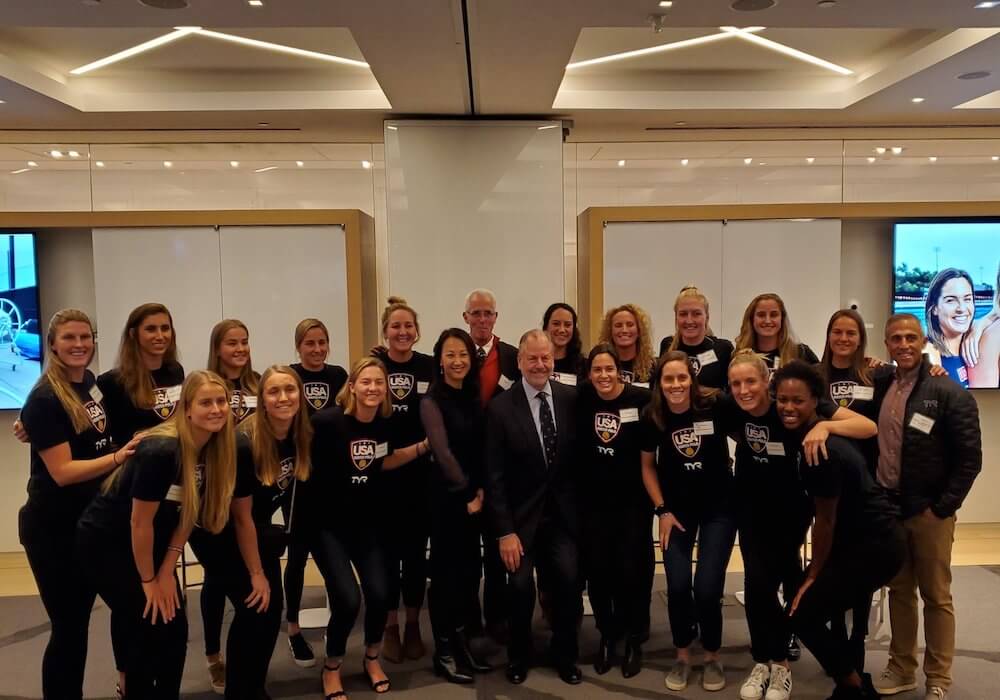
Events later today at the USA Water Polo General Assembly may shed light on divisive sexual abuse accusations that have roiled America’s national governing body for the sport. The organization’s biennial exercise in democracy, it is the first public event since Christopher Ramsey, USAWP’s Chief Executive Officer, and Christy Sicard, Senior Director, Membership and SafeSport Compliance, were linked last October to a civil suit against Bahram Hojreh, a one-time youth water polo coach.
[USA Water Polo aware in 2017 of sexual assault allegations against Bahram Hojreh and his club]
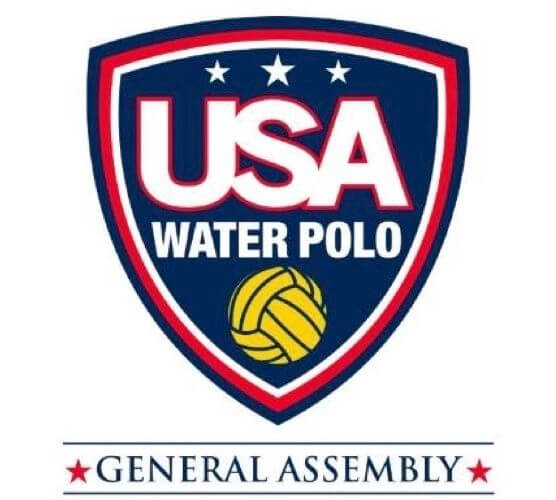 Making USAWP’s predicament especially gnarly is the fact that its current legal difficulties are mingled with a litany of old grievances against the organization’s leaders—including Ramsey and Board Chair Michael Graff—who have held office for more than a decade. Despite a record of success that has seen the organization’s finances improve markedly, membership more than double and prospects at the Tokyo Olympics for the men’s and women’s national teams rising, a crisis brought on by lawsuits and the coronavirus pandemic have Graff and Ramsey under siege.
Making USAWP’s predicament especially gnarly is the fact that its current legal difficulties are mingled with a litany of old grievances against the organization’s leaders—including Ramsey and Board Chair Michael Graff—who have held office for more than a decade. Despite a record of success that has seen the organization’s finances improve markedly, membership more than double and prospects at the Tokyo Olympics for the men’s and women’s national teams rising, a crisis brought on by lawsuits and the coronavirus pandemic have Graff and Ramsey under siege.
A board’s worst nightmare
To those who toil in the ranks of non-profit organizations, legal jeopardy is not unfamiliar. Typically overseen by a volunteer board, NPO paid staff often find themselves under duress to manage the responsibilities of mission, membership and fund-raising—with senior leadership bearing the brunt of whatever challenges the organization faces.
According to Katherine DeFoyd, a non-profit executive in the New York metropolitan area, the issue of sexual abuse is a board’s worst nightmare.
“We live in a litigious society, and lawyers name everyone under the sun in lawsuits,” said DeFoyd. “It does not mean that [the] CEO has knowledge of what was going on. I find it hard to believe that a CEO would have knowledge like that.”
With a membership of 16—including four athlete representatives—since 2006 the USAWP volunteer board has been helmed by Graff, who was tapped then to lead a United States Olympic Committee (USOC) forced reorganization of the country’s NGB for polo.
Leading advocates for the sport in the U.S. have long felt Graff and Ramsey have outstayed their usefulness. Now they have a means to present their complaints to USAWP’s general membership, during a Zoom session that begins at 10am (PST) and is expected to last a few hours.
Besieged by its members
USAWP’s current crisis was precipitated by Hojreh’s arrest in 2018. A former regional polo leader—he was once a member of the Southern Pacific Zone board, representing USAWP’s largest membership region—Hojreh is the subject of two separate sexual abuse complaints in California. Named in one, a civil suit filed last August, are Ramsey and Sicard, accused of negligence as a result of how they reported—or failed to report—2017 complaints of abuse by Hojreh against his players.
[SPECIAL REPORT: When Water Polo Play Becomes Sexual Abuse]
Reacting to this incident as well as other past transgressions are former national team players, Olympians, and coaches who are passionate about polo but not about Graff, Ramsey and the entire USAWP board. A strongly worded petition on iPetitions that has attracted 900 signatures and more than 100 comments demands the immediate resignation of the organization’s entire leadership.
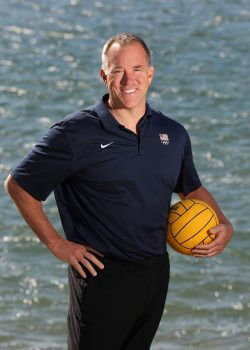
Christopher Duplanty. Photo Courtesy: Newportbeach.com
Named signers include a lengthy roster prominently associated with the sport in America: Christopher Duplanty, a member of the 1988, 1992 and 1996 US Men’s Olympic teams, and Erika Figge, a 2004 NCAA champion with USC. Liz Grimes was formerly involved with USAWP as a team manager, Associate Director of Sport Development and board director.
Lynn Kachmarik, a member of the USA Water Polo Hall of Fame, is a founding members of the U.S. women’s national team and one of the only women to have coached a men’s team in NCAA DI athletics; Andrew McDonald was a silver medalist on the 1984 men’s team.
Rachel Scott Ruano is a former national team member as well as former USAWP board member. Her husband, Rafael Ruano, is president and founder of the American River Water Polo Club, Sacramento’s largest; since 2002, he has been a member of the Central California Zone Board.
The Ramsey record
Criticism of Ramsey is not new. Calls for his ouster date back to the early days of his tenure; there is a thread on Water Polo Planet from November 2009 seeking opinions on his ouster (he “won” with 59% of the 51 votes cast).
Ramsey claims it’s not personal.
“First of all, I’m no stranger to criticism, and I always try to take it constructively,” he said in a recent interview. “We pull out the data points and examine if there are meaningful things we need to address, and so do members of our board. Things are discussed; it’s not like everyone is pretending that there aren’t critics.”
Ramsey cited 2006 as a pivotal moment for USAWP. Concerns about the organization’s viability motivated a group of long-time volunteers to draft a new set of by-laws that converted USAWP from a primarily volunteer organization to one with a professional staff.
“[T]here are some really brave people, especially from that group, that—when the U.S. Olympic Committee was ready to pull governing body status because of impending bankruptcy on the part of USA Water Polo—stepped aside from the old board and bylaw system and drafted new bylaws,” said Ramsey, who was then selected to lead the reformed entity.
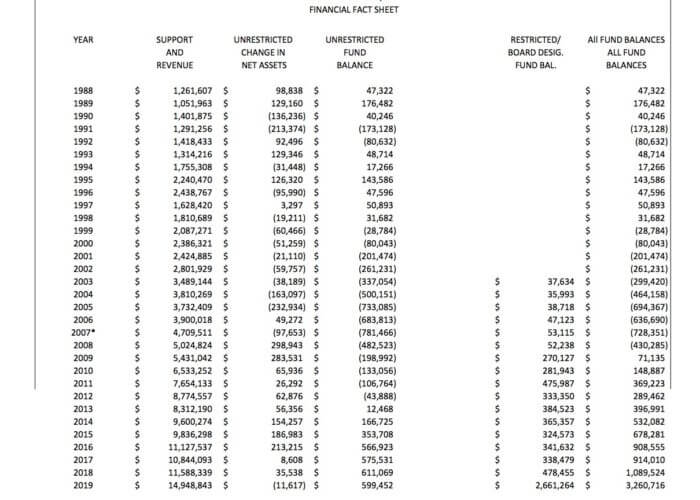
USAWP yearly financial accounting. Photo Courtesy: USAWP
According to reports supplied by Ramsey, USAWP’s fiscal health has been transformed since 2006, when he assumed his position. Then, USAWP faced a $700,000 deficit. At the beginning of the 2020 year, including restricted donations, USAWP reports a $3.2 million-dollar surplus on income of almost $15 million-dollars.
Even in a year when the majority of the organization’s events were cancelled due to the COVID-19 lockdown, Ramsey affirmed that USAWP finished in the black. Given that an organization’s continued viability is linked to its financial health, this is a significant accomplishment.
Then there’s Mike Graff, the current board chairman. The lone remaining member from the 2006 re-organization, Graff has been an object of heightened scrutiny, specifically due to his longevity on the USAWP board. Initially scheduled to end his tenure in 2013, a vote by membership at the 2012 General Assembly affirmed his continued leadership. In 2017, the organization’s bylaws were amended to allow him to serve what is now a fourth four-year term, which will officially end in June, prior to the 2021 Tokyo Olympics.
How long is too long?
Whether or not the Chairman has outstayed his welcome is debatable; what is not is how effective he’s been in leading an Olympic sport’s NGC as a volunteer. By the same financial criteria applied to Ramsey, Graff’s tenure has been extremely successful. That the U.S. women have won two Olympic golds under their leadership—and every other tournament worth playing—is another marker of Graff’s and Ramsey’s success with the organization.
Board leadership is not without its benefits, including entry to the Pan American Games, FINA World Championships and the Olympic Games—some of the world’s toughest sports tickets. For Graff, a successful financial services executive, it’s a perk he has certainly paid for. The board chair and his wife are identified as members of the Chairman’s Circle in the 2019 USAWP annual report’s charitable contribution section, a category reserved for donors that meet a $50,000 threshold.
DeFoyd expressed admiration for board service of individuals as dedicated as Graff.
“It’s very hard to find people to take leadership positions for these organizations because they’re volunteer positions,” she said. “So, it’s pretty common that board chairs draw the short straw and end up stuck doing it another year, especially in a time of crisis. It’s particularly hard to attract leadership.”
In a conversation with Arthur Rieman, a lawyer in The Law Firm for Non-Profits which operates in California, where USAWP is chartered, a question was posed: When has a board chair outstayed their welcome?
“Whether it’s good governance or not good governance, it’s not an uncommon occurrence,” Rieman said. “Certain board members stay on for obvious reasons. They’re good managers, good leaders, good donors. I’ve seen that happen many times.”
Can a virtual General Assembly be evenhanded? Or effective?
Raf Ruano, whose tenure as a member of the Central California Zone predated by four years the formation of the revised entity, has not been complimentary of current leadership.
“Speaking for myself, that there are many that care deeply about this sport and about having an organization and leadership represent the sport in the USA and internationally that we can be proud of,” he said in a text earlier this month. “I’m not giving up and if this effort fails I will evaluate the options available then.”
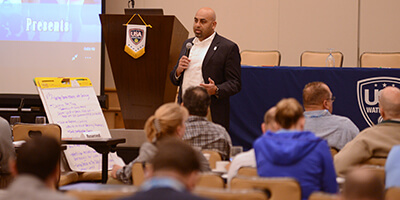
John Abdou at a live general assembly. Photo Courtesy: USAWP
Like so much in the world, Ruano and his petitioners are hamstrung by the coronavirus. As a virtual affair, today’s Assembly is subject to whoever controls the Zoom feed. Examining the USAWP’s most recent by-laws, there is a process whereby elected members of the organization’s 11 geographic zones, including Ruano, can object to board initiatives—but in closed door discussion. Members may also raise concerns in a public Question and Answer session during the Assembly, but this will be limited by who takes the questions.
In an organization where the top two leaders—Graff and Ramsey—speak almost exclusively for the board, understanding if there are any dissenting views among directors is difficult. Swimming World has repeatedly requested responses to questions directed to USAWP board members other than Chairman Graff; those requests have been declined.
This begs the question of transparency, which is part of the current grievance: for an organization with 38,000 members, the decisions of the very few seem to be, in the end, the ones that matter the most.
With Chip Brenner



